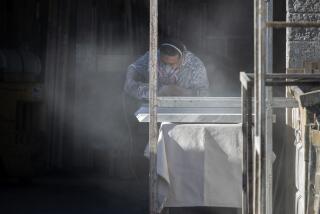Workers at Nevada Waste Site Get Lung Screening
- Share via
LAS VEGAS — Yucca Mountain project managers began a lung disease screening program Thursday for current and former workers who may have inhaled airborne silica at the federal government’s nuclear waste repository in the Nevada desert.
Two hundred letters have been mailed, and more will be sent soon to an estimated 1,200 to 1,500 current and former Yucca Mountain site workers who are eligible to take part in the free silicosis screening program, said program manager Gene Runkle.
Two current workers are being treated for silicosis, Runkle said, although he said it was not clear if they contracted the disease working at Yucca Mountain.
Project managers did not know where most former workers were. Most were involved in tunneling and underground operations or in setting up exploratory experiments underground beginning in 1992.
Any worker who spends or has spent 20 days a year working in the tunnels is eligible, Runkle said.
The Energy Department was providing names of former workers to the University of Cincinnati, which was handling silicosis screening. The university also was working with The Center to Protect Workers’ Rights to contact unions and find former Yucca Mountain workers.
Most worked from 1992 to 1998, when tunnels were bored at the Yucca Mountain site, 90 miles northwest of Las Vegas. Workers were issued dust masks as protective equipment, but Runkle said that from 1992 to 1996 the masks were not used consistently.
Tunnel ventilation and dust control was upgraded in 1995 and 1996, and worker monitoring for silica exposure was expanded in 1996.
Silica exists naturally in desert soils and in the rocks at Yucca Mountain. It can become airborne during tunneling, and inhaled silica can collect in the respiratory system. With long-term exposure, it can cause silicosis, a chronic lung disease with symptoms including coughing and shortness of breath, the Energy Department said.
Margaret Chu, director of the department’s Office of Civilian Radioactive Waste Management, said current screening and other measures were protecting the 140 workers now working at Yucca Mountain.
Runkle said that in 2001, two workers were exposed to elevated silica levels in separate instances.
The Energy Department wants to bury the nation’s spent nuclear fuel at Yucca Mountain beginning in 2010. Nevada is fighting the plan.
More to Read
Sign up for Essential California
The most important California stories and recommendations in your inbox every morning.
You may occasionally receive promotional content from the Los Angeles Times.













